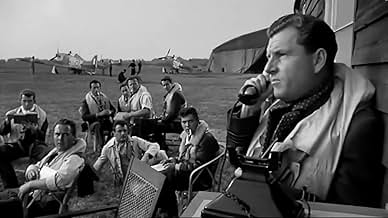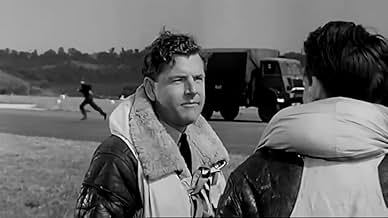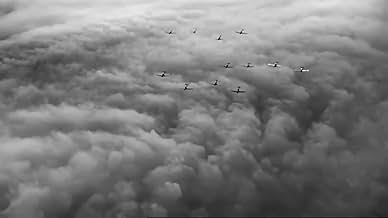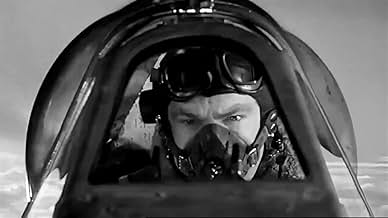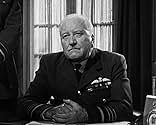IMDb RATING
7.2/10
3.1K
YOUR RATING
Biopic of RAF Group Captain Douglas Bader who, after having lost both legs, flew a British fighter plane during WWII.Biopic of RAF Group Captain Douglas Bader who, after having lost both legs, flew a British fighter plane during WWII.Biopic of RAF Group Captain Douglas Bader who, after having lost both legs, flew a British fighter plane during WWII.
- Director
- Writers
- Stars
- Won 1 BAFTA Award
- 1 win & 4 nominations total
Howard Marion-Crawford
- 'Woody' Woodhall
- (as Howard Marion Crawford)
- Director
- Writers
- All cast & crew
- Production, box office & more at IMDbPro
Featured reviews
What do you mean, you haven't seen this film? A classic World War 2 RAF adventure film depicting the true British spirit of one man's (Douglas Bader) fight to overcome the loss of both legs in a flying accident, to become a Wing Commander in the Battle of Britain. Lewis Gilbert keeps the film crackling along at a fast pace with Kenneth More, at the peak of his form, delivering the goods with a first rate supporting cast - don't miss it.
Douglas Bader (1910-1982) was one of Britain's most popular heroes of WWII, a celebrated combat pilot and Flight Commander. His triumphs during the Battle of Britain proved significant in the Allied victory. In 1941, after he was taken prison in German-occupied France, Bader caused headaches for the enemy with repeated escape attempts, and he was eventually confined to Colditz Castle, a prisoner-of-war camp reserved for such trouble-cases. And did I mention that he did all these things without the use of his legs? On December 14, 1931, Douglas Bader had crashed his aeroplane while attempting low-altitude maneuvers, sustaining such injuries that doctors were forced to amputate both legs. The characteristically resilient pilot later understated the gravity of his disaster with this laconic note in his logbook: "Crashed slow-rolling near ground. Bad show." Following the success of Paul Brickhill's biography, British director Lewis Gilbert (most noted for later directing several James Bond films) brought Bader's story to life, an inspirational testament to a man for whom "impossible" was not a word.
The natural comparison for 'Reach for the Sky (1956)' is Wyler's 'The Best Years of Our Lives (1946),' which starred a real-life war veteran (Harold Russell) who had lost both arms in combat. There are biographical distinctions, of course – Bader lost his limbs in peace- time, and later fought while "disabled" – but the basic theme of overcoming one's handicaps through hope and determination holds firm. Kenneth More {whom I recently discovered in the gripping Titanic docu- drama 'A Night to Remember (1958)'} brings a likable cockiness and fierce determination to the leading role. Bader's dogged resolve at times seems terse and even stubborn; his notion of success appears to hinge upon rejecting the helping hands of friends and loved ones. In his attitudes, there is a certain conceitedness, perhaps a necessary attribute for a pilot who rose to the military rank of Group Captain. More's portrayal certainly imparts these elements of vanity, but one can't help but be inspired by a man whose never-say-die outlook knows no bounds.
Muriel Pavlow plays Bader's wife, Thelma, a delicate woman who seems unfairly neglected while her husband chases his ambitions. Though given substantially less screen-time, the film's most interesting female character, I thought, was Dorothy Alison's nurse, who tends Bader back to health following his accident. Her appearance is brief, but incredibly subtle: just watch the series of conflicting emotions flicker across her face as Bader departs, love and sadness and everything in between. I had expected the nurse to make an appearance later in the film, but she appears to have been shunned permanently from Bader's life. This ties in nicely with the leading character: after resolving himself to be entirely self-sufficient, he must reject the one woman on whom he once relied so heavily. In Wyler's film, Russell's character accepts that he'll never be entirely independent, and it's only fitting that he should marry a woman who'll always be there to offer a helping hand. Bader rejects this helping hand; he's not much of a husband, but he is one hell of a battler.
The natural comparison for 'Reach for the Sky (1956)' is Wyler's 'The Best Years of Our Lives (1946),' which starred a real-life war veteran (Harold Russell) who had lost both arms in combat. There are biographical distinctions, of course – Bader lost his limbs in peace- time, and later fought while "disabled" – but the basic theme of overcoming one's handicaps through hope and determination holds firm. Kenneth More {whom I recently discovered in the gripping Titanic docu- drama 'A Night to Remember (1958)'} brings a likable cockiness and fierce determination to the leading role. Bader's dogged resolve at times seems terse and even stubborn; his notion of success appears to hinge upon rejecting the helping hands of friends and loved ones. In his attitudes, there is a certain conceitedness, perhaps a necessary attribute for a pilot who rose to the military rank of Group Captain. More's portrayal certainly imparts these elements of vanity, but one can't help but be inspired by a man whose never-say-die outlook knows no bounds.
Muriel Pavlow plays Bader's wife, Thelma, a delicate woman who seems unfairly neglected while her husband chases his ambitions. Though given substantially less screen-time, the film's most interesting female character, I thought, was Dorothy Alison's nurse, who tends Bader back to health following his accident. Her appearance is brief, but incredibly subtle: just watch the series of conflicting emotions flicker across her face as Bader departs, love and sadness and everything in between. I had expected the nurse to make an appearance later in the film, but she appears to have been shunned permanently from Bader's life. This ties in nicely with the leading character: after resolving himself to be entirely self-sufficient, he must reject the one woman on whom he once relied so heavily. In Wyler's film, Russell's character accepts that he'll never be entirely independent, and it's only fitting that he should marry a woman who'll always be there to offer a helping hand. Bader rejects this helping hand; he's not much of a husband, but he is one hell of a battler.
This may rate as one of the classic war films.
A (fairly) true to life film, about Douglas Bader, who it is reported was a fairly arrogant person, though highly driven.
Kenneth More in the lead role, delivers his usual top notch performance, and they rest of the cast just seem to fit together the way they should.
The film covers Baders life, and the loss of his legs in a flying accident that was in truth of his own making, and then how he puts his life back together afterwards.
It shows an amazing spirit and determination, to the extent that he got back into the RAF and became a successful pilot and air tactition.
This film should be watched by other people who have had the misfortune of an amputation, and i don't mean that in a condescending manner, Bader showed what you can do if you put your mind to it, he wouldn't let his disability beat him.
A really good movie, easily watched more than once, and good for more than one reason.
A (fairly) true to life film, about Douglas Bader, who it is reported was a fairly arrogant person, though highly driven.
Kenneth More in the lead role, delivers his usual top notch performance, and they rest of the cast just seem to fit together the way they should.
The film covers Baders life, and the loss of his legs in a flying accident that was in truth of his own making, and then how he puts his life back together afterwards.
It shows an amazing spirit and determination, to the extent that he got back into the RAF and became a successful pilot and air tactition.
This film should be watched by other people who have had the misfortune of an amputation, and i don't mean that in a condescending manner, Bader showed what you can do if you put your mind to it, he wouldn't let his disability beat him.
A really good movie, easily watched more than once, and good for more than one reason.
The facts of Douglas Bader's life were accurately portrayed in this excellent movie. It is a great movie to watch when you are feeling lousy, and life has got you down. Douglas Bader had an amazing spirit, and lived life to the fullest. Eventhough his lost both of his legs in a flying accident. That did not stop him from becoming a war hero. Who contributed a lot to destroy Nazism, and to preserve our free way of life. I salute Douglas Bader, and this excellent movie about his life.
The credits advise that some events and depictions of people/events have been altered for story telling purposes , so this film is not a strictly accurate history of Douglas Bader. Also played down somewhat is Baders arrogance and foolhardiness which lead to his disability in the first place. Still as a inspiration for disabled people and as an almost factual account of Baders life and as film entertainment , it's pretty good. Made reasonably close to the war years it is able to capture the feeling of those years quite well. It is a trifle 'stiff upper lip - what ?' but Kenneth More as usual turns in a good performance. Focusing mainly on Baders attempts, and resulting achievements in war time flying, after a crash means both lower legs have to be amputated. Quite gritty and not too sentimental this offering from director Lewis Gilbert stacks up well against similar films of the time.
Did you know
- TriviaRichard Burton was the first choice for the lead but he dropped out after he was offered the lead in Alexandre le Grand (1956) at what Lewis Gilbert describes as "three or four times the salary".
- GoofsWhen Bader is demonstrating his ability to fly the Hurricane to his new squadron of Canadian pilots, there is a long cut of the plane flying upside-down in a straight line. This was impossible in the Hurricane, as it had a gravity-fed carburettor. If you look carefully at the clouds, and how the sunlight reflects from them, the image has clearly been inverted.
- Alternate versionsOriginally released in Great Britain at 135 minutes; cut by 12 minutes before the American premiere.
- How long is Reach for the Sky?Powered by Alexa
Details
Box office
- Budget
- £380,000 (estimated)
- Runtime
- 2h 15m(135 min)
- Color
- Aspect ratio
- 1.85 : 1
Contribute to this page
Suggest an edit or add missing content


